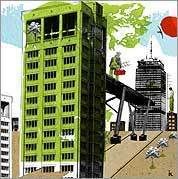BarbaricManchurian
Senior Member
- Joined
- Mar 12, 2007
- Messages
- 1,067
- Reaction score
- 65
The Globe Magazine said:
Tall Order
IF BOSTON IS SERIOUS ABOUT GOING GREEN, IT NEEDS TO JOIN OTHER MAJOR CITIES AND EMBRACE THE SKYSCRAPER. BY TOM KEANE
Sixteen Boston buildings rise 500 feet or more above the city. These are our skyscrapers - a respectable number, but we haven't been keeping pace. All but three were built in the 1980s or earlier. The tallest, the John Hancock, no longer impresses; it now ranks just 46th in the country. Meanwhile, the destruction of the World Trade Center notwithstanding, other cities race ahead. San Francisco has 14 skyscrapers either approved or in planning. New York has 39, Chicago has 30, and Toronto (Toronto!) 19.
Boston is looking to build - maybe - two. That's right: two.
Carol Willis, executive director of the Skyscraper Museum in (where else?) New York, theorizes that skyscrapers are potentially about three things: sex, power, and money. I think this a profound observation until it occurs to me that pretty much everything is about sex, power, and money. Still, stay with her formulation and one can begin to understand why we lag. A lot of us New Englanders are embarrassed about sex, don't like to brag about power, and cringe at ostentatious displays of wealth. Add to that our never-ending love affair with five-story 19th-century town houses and brownstones and a near pathological fear about the "Manhattanization" of Boston (all a consequence, argues Northeastern architecture dean George Thrush, of the way we have made a fetish of our Colonial origins), and one can begin to understand why Boston is so averse to making its skyline bigger and taller. I know. It sounds as if I have some sort of edifice complex myself. Boston's beauty is its small scale, its human-sized buildings. Real cities don't have to have skyscrapers, do they?
Yes, they do. It's not that I don't like those cute town houses - I live in one. But density is what cities are all about, skyscrapers are the ultimate form of density, and - here's the kicker - they are flat-out the greenest way to build. If we care about Boston, if we care about the environment, we should build up and build tall. A skyline is nothing to be ashamed of. Indeed, it may save us all.
Smirking analogies aside, skyscrapers aren't really about sex or power, says the museum's Willis. What they are about is money. The first skyscrapers were built because they were an extraordinarily efficient way to add square footage to a parcel of land. When land is expensive, it is far cheaper to build upward. The taller you go (at least until you hit 80 stories), the less the cost per square foot.
Yet today, the most compelling argument for skyscrapers is ecological. Newer skyscrapers are being designed in ways that dramatically minimize their impact on the environment, allowing them to achieve the highest rank possible ("platinum") under the LEED Green Building rating system. Water and heat are recycled. Solar panels reduce the need for outside energy. The entire life cycle of the building is managed, from construction to obsolescence, with some of the original materials getting reused to build other structures. This is all possible because of the building's size, which makes it economically feasible to do things that in a smaller structure would be far too costly.
But even if a skyscraper isn't LEED certified, it is the way the building is used that makes it so profoundly green. When people are packed together, the services needed to support those people are easier and cheaper to provide. Less travel is required. Everything can be provided in bulk. That's why, as David Owen argued in a seminal New Yorker piece in 2004, Manhattan on a per-capita basis may well be the most energy-efficient place in the country. The reason largely boils down to the fact that it is also the densest.
Building tall is building smart. Yet here in Boston, we're unmoved. Catcalls greeted Mayor Tom Menino's push to build a 1,000-foot tower at 115 Winthrop Square. Scorned for its hubris, it was mockingly dubbed "Tommy's Tower," making for an amusing but wrongheaded cheap shot. The very thing that makes cities vital - the proximity of everyone and everything - is what skyscrapers do best. In a world where environmental issues loom ever larger, "the heart of the question is how we build sustainably," says Diane Georgopulos, president-elect of the Boston Society of Architects. Skyscrapers are the answer.
Plus, they do look cool.
Tom Keane, a Boston-based freelance writer, contributes regularly to the Globe Magazine. E-mail him at tomkeane@tomkeane.com.
? Copyright 2008 Globe Newspaper Company.
http://www.boston.com/bostonglobe/magazine/articles/2008/01/06/tall_order/
